Pauline Epistles, 9 vols. (The New International Commentary on the New Testament | NICNT)
Digital Logos Edition
Overview
This collection includes the volumes on the Pauline Epistles from The New International Commentary on the New Testament to provide an exposition of Scripture that is thorough and abreast of modern scholarship, yet at the same time loyal to Scripture as the infallible Word of God. This conviction is shared by all contributors to The New International Commentary on the New Testament and defines the goal of this ambitious series.
This decades-long project has become recognized by scholars, pastors, and serious Bible students as critical yet orthodox commentary marked by solid biblical scholarship within the evangelical Protestant tradition. The New International Commentary on the New Testament serves as an authoritative guide to the text of Scripture, bridging the cultural gap between today’s world and the world of the Bible. Each volume in the NICNT aims to help us hear God’s word as clearly as possible.
Scholars, pastors, and serious Bible students will welcome the fresh light that this commentary series casts on ancient yet familiar biblical texts. The contributors apply their proven scholarly expertise and wide experience as teachers to illumine our understanding of the New Testament. As gifted writers, they present the results of the best recent research in an interesting, readable, and thought-provoking manner.
Each commentary opens with an introduction to the biblical book, looking especially at questions concerning its background, authorship, date, purpose, structure, and theology. A select bibliography also points readers to resources for their own study. The author’s own translation from the original Hebrew and Greek texts forms the basis of the commentary proper. Verse-by-verse comments nicely balance the in-depth discussions of technical matters–such as textual criticism and critical problems–with exposition of the biblical writer’s theology and its implications for the life of faith today.
Key Features
- Verse-by-verse commentary
- In-depth discussion of textual and critical matters
- Introductions to each book’s authorship, date, purpose, structure, and theology
Product Details
- Title: The New International Commentary on the New Testament: Pauline Epistles (NICNT)
- Series: The New International Commentary on the New Testament (NICNT)
- Publisher: Eerdmans
- Volumes: 9
- Pages: 6,399
- Resource Type: Commentaries
- Topic: Pauline Studies
Individual Titles
- The Epistle to the Romans by Douglas J. Moo
- The First Epistle to the Corinthians by Gordon D. Fee
- The First Epistle to the Corinthians, Revised Edition by Gordon D. Fee
- The Second Epistle to the Corinthians by Paul Barnett
- The Epistle to the Galatians by Ronald Y. K. Fung
- Paul’s Letter to the Philippians by Gordon D. Fee
- The Epistles to the Colossians, to Philemon, and to the Ephesians by F. F. Bruce
- The First and Second Epistles to the Thessalonians by Gordon D. Fee
- The Letters to Timothy and Titus by Philip H. Towner
This title is included in the following collections
You can save when you purchase this product as part of a collection.
2025 繁體中英雙語典藏版圖書資料庫
$5,999.99$4,499.992025 简体中英双语典藏版图书资料库
$5,999.99$4,499.992025 이중언어 포트폴리오 서재
$6,399.99$4,799.99Eerdmans Commentary Collection...
$8,445.13$6,499.99
- $10,999.99$8,249.99
- $11,399.99
- $11,399.99
- $23,999.99$17,999.99
- $21,749.99
- $24,999.99
- $37,403.33$27,999.99
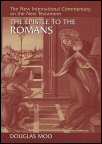
Paul’s letter to the Romans has been called “the quintessence and perfection of saving doctrine.” Perhaps the most challenging and thoroughly doctrinal book of the entire New Testament, Romans deals with many issues that are basic to Christian theology and practice. In this volume respected New Testament scholar Douglas J. Moo provides a superb study of Paul’s letter to the Roman Christians and restates the enduring message of Romans for Christians today.
Based on the English text but bringing into the discussion the underlying Greek at every point, this commentary focuses both on theological meaning and on contemporary significance. Moo contributes to the continuing debate regarding Paul’s teaching on such issues as Jewish law and the relationship between Jews and Gentiles in the people of God. He also critically interacts with “the new perspective on Paul,” highlights Romans’ emphasis on “practical divinity,” and traces the theme of gospel throughout the epistle.
Twelve years in the making and a steady seller during its first decade in print, Moo’s Epistle to the Romans will continue to serve as a standard exposition of Romans.
This is a monumental work that can be placed among the best commentaries on Romans. If one wants to know the content of Romans, this commentary needs to be consulted. Helpful to teachers, pastors, and students.
If a student could own but one commentary on Romans, this should be it–now and for a long time to come.
–Craig L. Blomberg, distinguished professor of New Testament, Denver Seminary
In The Epistle to the Romans, Douglas Moo provides a very good, detailed analysis of Paul’s most important letter.
–Catholic Biblical Quarterly
This commentary displays marks of fine scholarship and practical interest. Douglas Moo shows himself to be keenly aware of theological subtleties and issues, and his work is informed by a strong sense of the history of interpretation of Romans.
–Journal of Theological Studies
Douglas J. Moo is Blanchard Professor of New Testament at Wheaton College.
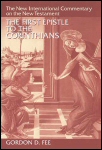
This award-winning commentary on 1 Corinthians by Gordon D. Fee has been lauded as the best study now available on Paul’s exciting and theologically rich first letter to the Corinthians.
Fee offers a readable exposition of 1 Corinthians that clearly describes the meaning of Paul’s ideas and their larger theological relevance. The more scholarly dimension of the work, including Fee’s considerable interaction with other commentators, is found in the footnotes.
Several features make this commentary unique. First, Fee takes great care to establish the all-important historical/literary context of this letter by including numerous sectional introductions that reconstruct the historical background and trace the flow of Paul’s argument. Fee is also concerned to exegete the whole book from a consistent perspective as to the historical situation. Second, Fee’s expertise in textual criticism has led him to discuss every exegetically significant variant, some at considerable length. Third, Fee concludes almost every paragraph with some observations about application–illustrating his deep concern that the Word of God be a living word for today.
This is an excellent commentary. Writing in the best tradition of evangelical scholarship, Fee has produced the most thorough interpretation of 1 Corinthians to have appeared in English in this generation.
–Journal of Biblical Literature
A masterpiece. The finest and most comprehensive scholarly effort on 1 Corinthians in print today.
–Criswell Theological Review
This commentary is a full and thorough reading of the text, reliable in its discussions of the scholarly debates, cautious in its exegetical judgments, sensitive in its handling of Paul, and constructive in its theological content. It offers more substance than any other available commentary.
–Studies in Religion
This is an excellent commentary! If the reviewer could own only one commentary on 1 Corinthians, this would be it.
–Southwestern Journal of Theology
Gordon D. Fee is professor emeritus of New Testament studies at Regent College in Vancouver, British Columbia. In addition to his many highly respected commentaries and biblical studies, he is also the author of Paul, the Spirit, and the People of God, Gospel and Spirit, and How to Read the Bible for All Its Worth.
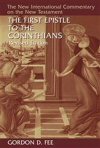
This landmark commentary, originally published in 1987, has been lauded as the best study available of Paul's theologically rich first letter to the Corinthians. Writing primarily for pastors, teachers, and students, Gordon Fee offers a readable exposition of 1 Corinthians that clearly describes the meaning of Paul’s ideas and their larger theological relevance.
Fee’s revised edition is based on the improved, updated 2011 edition of the NIV, and it takes into account the considerable scholarship on 1 Corinthians over the past twenty-five years. Fee has also eliminated “chapter and verse” language—totally foreign to Paul's first-century letter—relegating the necessary numbers for “finding things” to parentheses.
An impressively thorough commentary, which offers both judicious comment and useful documentation. . . . It deserves to rank as one of the leading commentaries on 1 Corinthians.
—Anthony C. Thieselton, professor of Christian theology, University of Nottingham
Gordon D. Fee is professor emeritus of New Testament studies at Regent College in Vancouver, British Columbia. In addition to his many highly respected commentaries and biblical studies, he is also the author of Paul, the Spirit, and the People of God, Gospel and Spirit, and How to Read the Bible for All Its Worth.
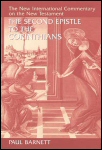
This excellent commentary on 2 Corinthians by Paul Barnett illumines the historical background of the church at Corinth and clarifies the meaning of Paul’s passionate letter both for those first-century Christians and for the church today.
Assuming the unity of the letter, for which extensive argument is offered, Barnett takes the view that Paul is, in particular, addressing the issue of triumphalism in Corinth. This triumphalism is expressed by the newly arrived missionaries who portray Paul as “inferior” to themselves; it is also endemic among the Corinthians. According to Barnett, the recurring theme of the letter is “power-in-weakness,” based on the motif of the Resurrection of the Crucified, which lies at the heart of the Gospel of Christ. Also fundamental to the letter is the theme of fulfillment of the “promises of God” by Christ and the Spirit under the New Covenant.
Written for scholars, pastors, and laypeople alike, this commentary on 2 Corinthians will be a lasting reference work for those interested in this important section of Scripture.
This Pauline letter is rightly regarded by Paul Barnett as a favorite with scholars, having generated a wealth of literary studies in recent times. It also remains an epistle full of problems–historical, textual, and interpretive–for modern readers, especially those who use 2 Corinthians for preaching. Yet it is a rich mine of Gospel truths and a valuable resource for understanding Paul’s teaching on proclamation, ministry, and the Christian life. Barnett is well qualified to handle all these complexities with a sure touch, a scholar’s expertise, and a pastor’s concerns. Above all, he does so with a deft style that makes this new volume accessible to all. A warm welcome awaits this commentary.
–Ralph P. Martin, former professor emeritus of New Testament, Fuller Theological Seminary
Barnett has lived with Paul and the Corinthians for a number of years. His well-known expertise as a New Testament historian comes to the fore in his insightful illumination of the historical background to this Pauline epistle. His detailed exegesis in the commentary is clear, rigorous, and sane, and I found his tracing of the rhetorical movement of the arguments through the letter to be invaluable. Readers will also appreciate the helpful distinctions drawn between what was uniquely Pauline and what of Paul stands as a model for pastors, missionaries, and Christians.
–Peter O’Brien, vice principal, Moore Theological College, Newtown, New South Wales, Australia
Paul Barnett is a visiting fellow in ancient history at Macquarie University, and teaches at Moore College in Sydney and Regent College in Vancouver. His many other books include The Second Epistle to the Corinthians (NICNT) and The Birth of Christianity: The First Twenty Years (both Eerdmans).
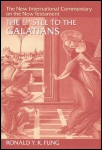
This commentary by Ronald Y. K. Fung has been added to the NICNT series to address significant new questions regarding the study of Galatians that have arisen since the publication of Herman N. Ridderbos’ commentary–the original NICNT volume on Galatians–in 1953.
Begun under the mentorship of F. F. Bruce at the University of Manchester, England, Fung’s work on Galatians offers solid, reliable exposition of the text while also providing a fresh assessment of the large number of interpretive questions–past and present–raised by Paul’s letter. This work also examines Galatians specifically as Paul’s most direct defense and exposition of justification by faith, which Fung says is the central motif of Paul’s understanding of the Gospel.
Here is a rare exegetical feast, combining careful grammatical analysis, balanced judgment on debatable issues, and full notes that reflect acquaintance with a wide range of scholarly literature. It is exciting to have from the pen of an outstanding Chinese New Testament scholar such a splendid commentary that will deservedly take its place alongside the standard commentaries in English by Lightfoot, Burton, Betz, and Bruce.
–Murray J. Harris, professor emeritus of New Testament exegesis and theology, Trinity Evangelical Divinity School, Deerfield, Illinois
Dr. Fung writes in a beautifully clear and simple style with careful attention to detail. Here is sound scholarship and reverent exegesis which will greatly enhanced the distinguished series in which it appears.
–I. Howard Marshall, emeritus professor of New Testament exegesis, University of Aberdeen, Scotland
This expert and lucid commentary on Galatians will be a very valuable resource to all students grappling with the interpretation of Galatians and with recent scholarly discussion of Paul and Pauline theology.
–David Wenham, vice principal, Trinity College, Bristol
Ronald Y. K. Fung is a professor of biblical studies and resident scholar at the China Graduate School of Theology in Hong Kong. He has written several commentaries in Chinese and contributed articles to such volumes as Dictionary of Paul and His Letters.
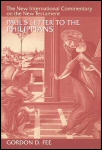
This commentary by respected New Testament scholar Gordon D. Fee is a scholarly yet thoroughly readable study of Paul’s letter to the suffering community of believers in Philippi.
Working directly from the Greek text but basing his comments on the New International Version, Fee sets Paul’s letter to the Philippians squarely within the context of first-century “friendship” and “moral exhortation” to a church facing opposition because of its loyalty to Jesus Christ. At the same time Fee gives equal concern to the letter’s theological and spiritual relevance.
Important features of this commentary include a remarkable comparison of Philippians to two well-known types of letters in the Greco-Roman world: the letter of friendship and the letter of moral exhortation; an introduction that discusses the occasion, authenticity, and theological contributions of Philippians; and scholarly insights that resolve many of the formal and structural issues that have long puzzled New Testament scholars.
This is truly a massive commentary on Philippians–massive in its detailed consideration of introductory matters, massive in its detailed examination of the Greek text, and massive in its exposition of theological matters. Word by word and phrase by phrase, Fee analyzes the argument and distills the theology from what he takes to be Paul’s letter from his Roman imprisonment. He avoids no problem, is guilty of no oversimplifications, is unwilling to impose false clarity where ambiguity is unavoidable, yet through it all he finds the theology of this little gem from the mind of Paul. This is a first-rate commentary, and much will be learned from a careful reading of it.
–Paul J. Achtemeier, former Herbert Worth and Annie H. Jackson Professor of Biblical Interpretation, Union Theological Seminary, Richmond, Virginia
This is an exceedingly important contribution. Fee has become one of the premier commentators on the Pauline letters. Precious few scholars can claim comparable mastery of the whole range of exegetical studies, from the technical details of textual criticism to the broad challenges of theological reflection. Moreover, he combines readable exposition in the text with thorough documentation in the footnotes. A real treasure.
–Moises Silva, former professor of New Testament theology, Westminster Theological Seminary
Gordon D. Fee is professor emeritus of New Testament studies at Regent College in Vancouver, British Columbia. In addition to his many highly respected commentaries and biblical studies, he is also the author of Paul, the Spirit, and the People of God, Gospel and Spirit, and How to Read the Bible for All Its Worth.
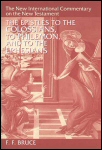
This collection of three commentaries in one volume completes F. F. Bruce’s lifelong study of Paul’s writings. With the publication of this volume, Bruce–one of the most respected New Testament scholars in the world–finished writing commentaries on all the Pauline epistles except the Pastorals.
According to Bruce, there are important reasons for linking Colossians, Philemon, and Ephesians together in one work. The study of both Ephesians and Colossians, says Bruce, confirms his belief that Ephesians continues the line of thought followed in Colossians–in particular because it draws out the implications of Christ’s cosmic role (set forth in Colossians) for the church, which is his body. At the same time Ephesians constitutes the crown of Paulinism, gathering up the main themes of the apostle’s teaching into a unified presentation specie aeternitatis. The letter to Philemon, too, has a close association to Colossians, and is appropriately included in this volume.
Here is [F. F. Bruce’s] massive learning, thorough acquaintance with the ancient world, careful and cautious assessment of theories, love of Paul, and straightforward exposition of what Paul was saying. The student who works carefully through this volume will not only learn the main outlines of scholarly debate but will come to an understanding of the theological message of these letters.
–Expository Times
This is a fine commentary and is all that we have come to expect from the pen of Bruce, the doyen of evangelical scholars: clear, accurate, easy to read, and giving evidence of the author’s breadth of learning and charity when disagreeing with the viewpoints of others.
–Journal of the Evangelical Theological Society
Bruce is now summing up a lifetime of productive study of these materials.
F. F. Bruce was Rylands Professor of Biblical Criticism and Exegesis at the University of Manchester, England. During his distinguished career he wrote numerous widely used commentaries and books and served as the general editor of the New International Commentary on the New Testament series from 1962 to 1990.
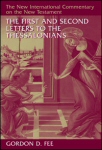
In this commentary Gordon Fee aims first and foremost to offer a fresh exposition of the text of 1 and 2 Thessalonians. He shows the reader what is in the biblical text, what the text meant in the first century, and what it means now. Fee reveals the logic of each argument or narrative before moving on to the details of each verse, and he concludes each section with a theological-practical reflection on the meaning of the text today. Among other things, Fee explores the occasion for writing for each epistle, restoring 2 Thessalonians to the place it deserves as a full companion to the first letter, rather than merely a tagalong to 1 Thessalonians.
Gordon Fee brings his exceptional skill as an exegete together with his pastor’s heart in this very helpful commentary on Paul’s two Thessalonian letters. Fee delivers his depth of insight into the text in prose that is a model of clarity and readability. Everyone will appreciate his concise and challenging applications at the end of each section.
–Clinton E. Arnold, professor of New Testament language and literature, Talbot School of Theology
Fee could not be boring even if he tried. The zest of his prose makes him exciting to read, and his scholarship is always rigorous.
–D. A. Carson, research professor of New Testament, Trinity Evangelical Divinity School
Gordon D. Fee is professor emeritus of New Testament studies at Regent College in Vancouver, British Columbia. In addition to his many highly respected commentaries and biblical studies, he is also the author of Paul, the Spirit, and the People of God, Gospel and Spirit, and How to Read the Bible for All Its Worth.
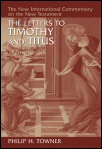
The most accessible, most broadly pitched full-length commentary on Timothy and Titus, this NICNT volume explores Paul’s three letters to Timothy and Titus within their historical, religious, and cultural settings.
In his introduction, Towner sets out the rationale for his historical approach, questions certain assumptions of recent critical scholarship, and establishes the uniqueness and individuality of each letter. Significantly, Towner’s work displays unprecedented interaction with four recent major commentaries on these Pauline letters. Centered on an outstanding translation of the Greek text and including thorough footnotes, bibliographical citations, and indexes, Towner’s commentary on Timothy and Titus is sure to become a standard reference for busy pastors, students, and scholars.
Few if any scholars could be more qualified to give birth to this volume. Towner’s newest work fills an important gap–an up-to-date, exegetically solid, mid-range commentary on the English text, fully informed by the Greek and wholly abreast of current scholarship. Rejecting the unproven theory of non-Pauline authorship and ably highlighting the individual distinctives of each letter, often obscured by the homogenizing label “Pastoral Epistles,” Towner has produced what may wind up being the most useful commentary among the broadest range of English-language readers for many years to come.
–Craig L. Blomberg, distinguished professor of New Testament, Denver Seminary
When reading this commentary, I felt as if I were sitting in a room listening to Paul and his associates explain the Gospel in ever fresh ways for a new day. Phil Towner’s readable, exciting exposition of these wonderful letters will usher many into a new age of studies on the Pastorals.
–Scot McKnight, professor of religious studies, North Park University
The mature work of a scholar who has had a love affair with the letters to Timothy and Titus over a quarter century, this is arguably the finest and most useful commentary based on the English text of the letters (with adequate discussion of matters Greek in the footnotes). Student and preacher alike will treasure this user-friendly treatment for its careful summarizing of essential data and also for its numerous shafts of fresh light from a scholar who knows all the contemporary discussion but is not beholden to any authority except that of the text itself.
–I. Howard Marshall, emeritus professor of New Testament exegesis, University of Aberdeen, Scotland
Philip H. Towner is dean of Nida Institute for Biblical Scholarship at the American Bible Society in New York, New York.